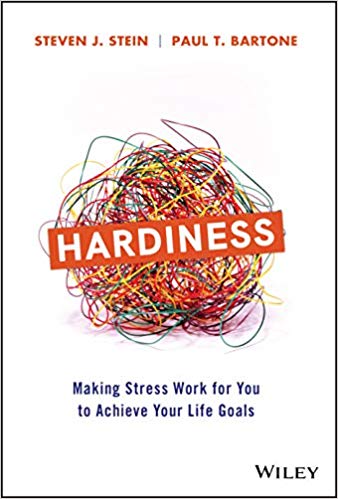Hardy Response to the Coronavirus Crisis
 The coronavirus pandemic has brought new levels of stress and uncertainty into our lives. And unlike some life crises, this one is likely to go on for months and get worse before it gets better. Medical workers and first responders are stretched to the max, and many of us are confined to home, unsure if we’re infected, and wondering if we will have a job to go back to or how we can pay our bills. What can we do to cope and survive in the midst of it all? Based on the “hardiness” model of healthy coping with stress, here are 8 steps to help you through these tough times.
The coronavirus pandemic has brought new levels of stress and uncertainty into our lives. And unlike some life crises, this one is likely to go on for months and get worse before it gets better. Medical workers and first responders are stretched to the max, and many of us are confined to home, unsure if we’re infected, and wondering if we will have a job to go back to or how we can pay our bills. What can we do to cope and survive in the midst of it all? Based on the “hardiness” model of healthy coping with stress, here are 8 steps to help you through these tough times.
Step 1: Face reality…this is going to be painful.
Although it’s good to be an optimist, it’s also important to face problems honestly and head-on. This is a serious crisis, and it’s going to hurt. Lots of people are going to get sick and many will die. The financial hit will also be severe for most of us. So step 1 is to look at the coronavirus crisis in the eye, and admit that it is going to cause a lot of pain and distress.
Step 2: Stay informed.
Take control by getting as much factual information as you can. Be careful what news sources you pay attention to because some are not accurate. Stay alert for scams and “fake news.” A good resource for factual information on the virus is the Johns Hopkins Coronavirus Resource Center https://coronavirus.jhu.edu/ Another is the Center for Disease Control and Prevention (CDC) at https://www.cdc.gov/coronavirus/2019-ncov/index.html. Keep an eye on world news.
Step 3: You also take control by following the advice of public health experts.
In this case, it means taking “personal protective measures” maintaining distance from other people, staying away from crowds, washing and sanitizing hands, and for many of us, staying at home.
Step 4: Use your social support system. Isolation is difficult.
Make use of communications technologies to keep in touch with family members and friends. Phone and video calls, chats and emails are all good ways to maintain contact with loved ones.
Step 5: Look for ways to help.
If you have any resources that may be helpful, put them to use. For example, many home-bound people with sewing machines are now making protective masks to give to health care workers. Check up on your neighbors. Do you have some way to contribute?
Step 6: Maintain your physical health.
Do some exercise. Being confined to home doesn’t mean you have to become a couch potato or lock yourself in front of a computer screen. Get up and move around. Play your favorite music and dance. If your situation allows, get outside for a walk or run in the neighborhood. If you have one, shake the dust off the treadmill in your basement. Have a glass of wine. And catch up on your sleep.
Step 7: See it as a challenge.
If you’re stuck at home, this can be a good thing. It can be a golden opportunity to do things with your family, such as playing board games, puzzles, or cooking creative meals together. Despite the disruption the virus is causing, it’s forcing a pause in the normal fast-pace of our existence. You may have time now to do some things you ordinarily don’t have time for, whether it’s cleaning out the closet or garage or deleting old files on your computer. Think about other things you can do. It may be learning a new language, playing a musical instrument, or taking an online course. If you like to read, most libraries now offer free online e-books. And although watching TV or movies on Netflix or Disney is fine, you’ll get more personal benefit from active self-improvement activities. This helps boost your sense of control and progress despite the restrictions caused by the virus.
Step 8: Use humor. Laughing is a good release.
While it’s never good to laugh at someone else’s misfortune, we can certainly laugh at ourselves and at the sometimes humorous situations we find ourselves in. Part of hardiness is being attuned to the funny side of life. So don’t be afraid to laugh! The coronavirus crisis is putting extreme strains on the entire world. Make no mistake, it’s a global disaster of major proportions and one that will hurt us all in various ways. But there are things we can do. By keeping a hardiness mindset, you’ll make the best of it, and maybe even emerge stronger and wiser in the end. Stay safe and stay hardy!
 This was written by Colonel (Ret.) Paul T. Bartone, Ph.D.. Paul is a Visiting Research Fellow at the Institute for National Security Policy, National Defense University. Bartone is the past-president of the American Psychological Association’s Society for Military Psychology. A Fulbright scholar, he holds an M.A. and Ph.D. in psychology and human development from the University of Chicago.
This was written by Colonel (Ret.) Paul T. Bartone, Ph.D.. Paul is a Visiting Research Fellow at the Institute for National Security Policy, National Defense University. Bartone is the past-president of the American Psychological Association’s Society for Military Psychology. A Fulbright scholar, he holds an M.A. and Ph.D. in psychology and human development from the University of Chicago.
Like What Your Read? Get Career Pivot Insights
Do You Need Help With ...

Check out our Help Center where you have access to 14 different content portals.
